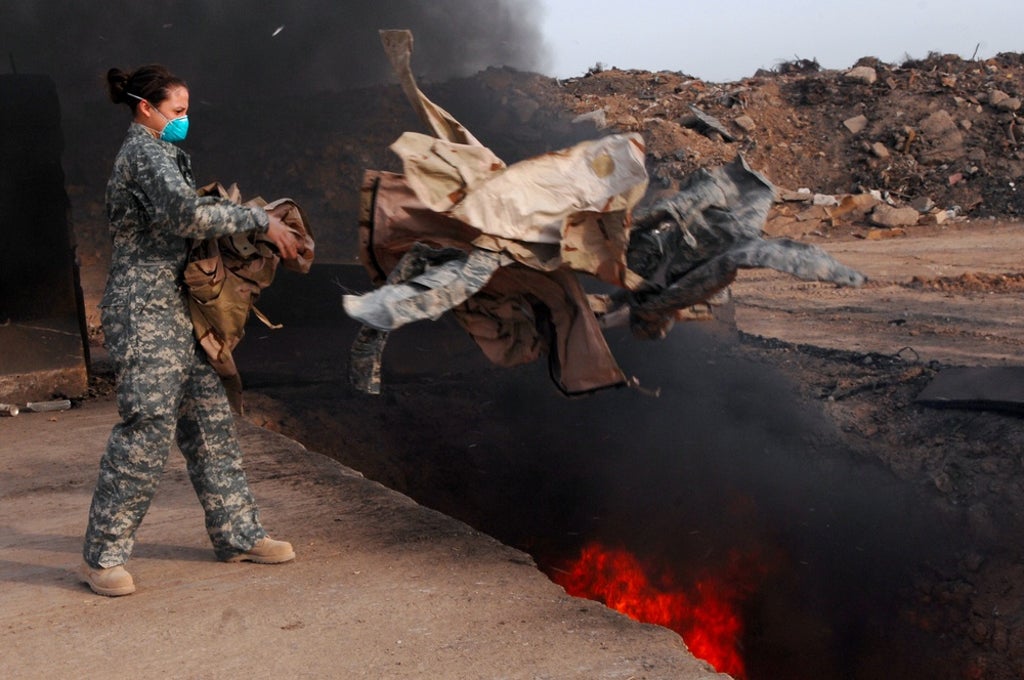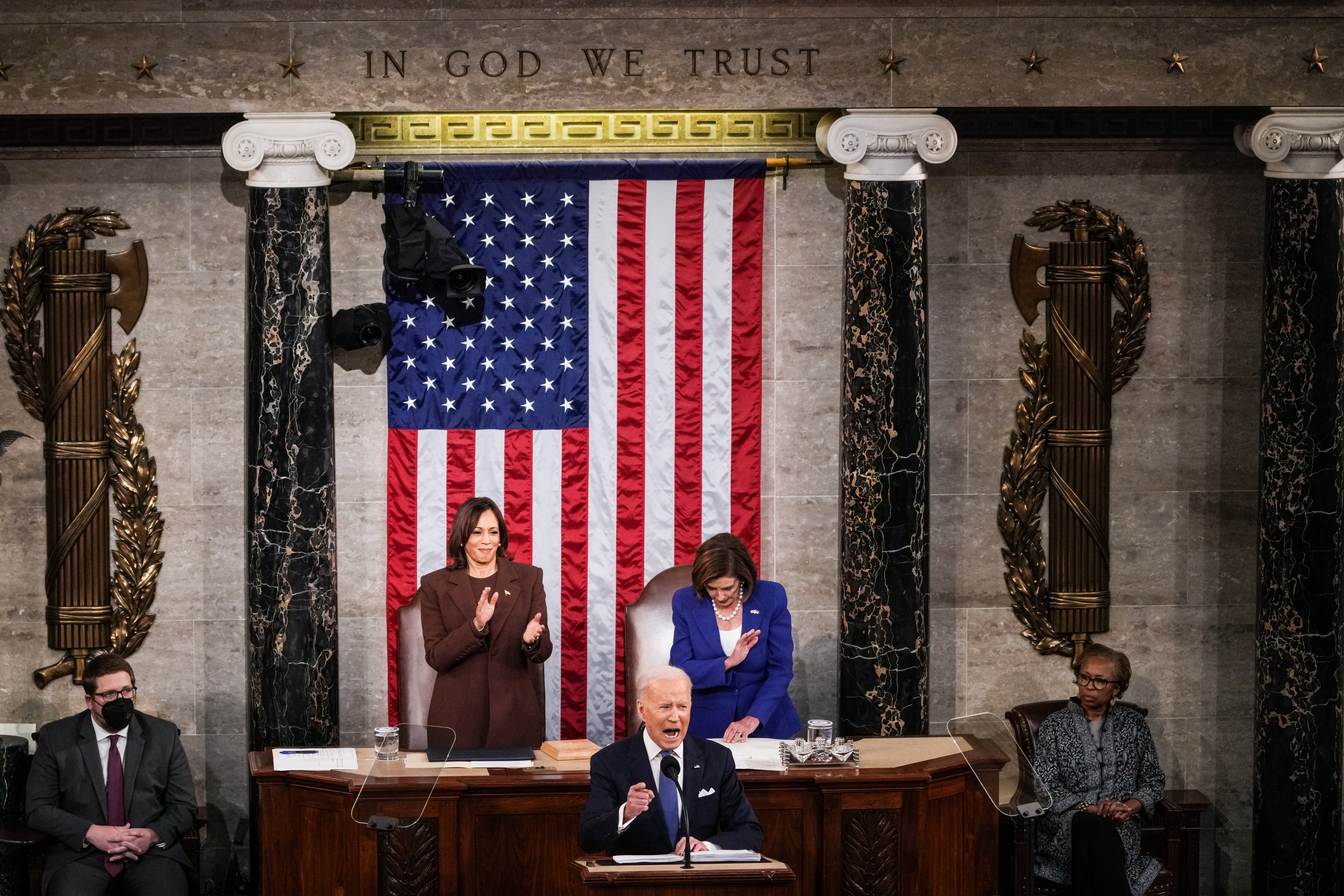
The Biden administration has added nine respiratory cancers to the list of illnesses presumed to be caused by toxic exposure to burn pits as part of the president’s promise to better support US veterans returning from war sick and dying from their service.
President Joe Biden announced on Monday that veterans who are suffering from any of the nine conditions and who were deployed overseas to serve in the Gulf War, the Iraq War or the War in Afghanistan will now be given automatic access to the healthcare and disability claims that they need.
Mr Biden had announced the addition of the nine conditions in his State of the Union address, with the Department of Veterans Affairs “delivering on that promise” on Monday.
“In my State of the Union address, I announced that we would propose expanding disability and health benefits to veterans suffering from nine rare respiratory cancers,” he said.
“Today, the Department of Veterans Affairs is delivering on that promise and upholding that sacred obligation to the women and men who have worn the uniform of our country.”
The new conditions are: squamous cell carcinoma of the larynx; squamous cell carcinoma of the trachea adenocarcinoma of the trachea; salivary gland-type tumors of the trachea; adenosquamous carcinoma of the lung; large cell carcinoma of the lung; salivary gland-type tumors of the lung; sarcomatoid carcinoma of the lung; and typical and atypical carcinoid of the lung.
The move marks the latest commitment from the Biden administration to take the issue of burn pits seriously after veterans have spent years fighting for their right to access much-needed healthcare for illnesses caused by their service to their country.
“America’s veterans are the best of us. I’ve always believed that we have a sacred obligation to equip all those we send into harm’s way and to care for them and their families when they come home,” the president said in a statement.
“That’s especially true for veterans suffering the visible and invisible wounds of war, whether they were injured in combat or breathed in toxic smoke from burn pits on base. We can and must do more to address the harms that come from hazardous exposures, which have gone unaddressed for far too long.”
Mr Biden pointed to the “horrible lesson” learned with Agent Orange after the Vietnam War saying: “I refuse to repeat that mistake when it comes to the veterans of our wars in Iraq and Afghanistan”.
Agent Orange was a herbicide used by the US military to clear the heavy jungle during the Vietnam War.

When troops returned home, many fell ill after being exposed to the toxic substance but they had to fight for years for their conditions to be recognised as connected to their service.
The Agent Orange Act was finally passed in 1991 – 16 years after the war ended – and some conditions were only added as presumptive long after that.
Now, the chronic illnesses caused by toxic exposure to burn pits during America’s post-September 11 wars are seen as the modern-day Agent Orange.
During America’s post-September 11 wars, huge open-air pits were used to burn mountains of trash including food packaging, human waste and military equipment on bases in Iraq and Afghanistan.
Thousands of US service members returned home from deployment and developed health conditions including rare cancers, lung conditions, respiratory illnesses and toxic brain injuries caused by breathing in the toxic fumes from the pits.
A staggering 3.5m servicemembers and veterans have been exposed to burn pits and airborne toxins while serving the US overseas, according to estimates from the Veterans Affairs.
But, at present, the burden of proof is on veterans to prove their condition is directly caused by this toxic exposure and so only around one in five claims for disability benefits where burn pits are cited are approved by the VA.
Last year, the VA added three respiratory conditions to the presumptive list, which the veteran community described to The Independent as “political breadcrumbs” but a sign of good faith that the Biden administration was taking the issue seriously.
The veteran community was equally underwhelmed with the addition of the nine cancers, when it was first announced in Mr Biden’s SOTU address.
Danielle Robinson, whose late husband Sgt First Class Heath Robinson died from a rare form of cancer caused by toxic exposure to burn pits in May 2020 at the age of 39, said at the time that the conditon her husband died from was still not on the list.
This means that, almost two years on from his death, his condition is still not covered by the VA.
“The problem is that right now we have presumptions for diseases that are not terminal and what President Biden announced last night with the nine cancers - those are only going to cover a few hundred soldiers as it’s not the more common cancers that have been linked to toxic exposure,” she told The Independent at the time.
“So the announcement of those nine cancers was great for the veterans that will qualify for that but it still leaves out a very large portion of the veteran population so it’s not good enough.”

Still noticeably absent from the list is constrictive bronchiolitis – the rare condition that many veterans who previously spoke to The Independent have and which doctors say can only be caused by toxic exposure – and glioblastoma - the rare brain cancer that Mr Biden’s son Beau Biden died from and which the president has now said he believes was caused by his exposure to burn pits.
However, veterans did describe the additions as a “step forward” and a sign that the president is taking the issue seriously.
After years of being ignored by the previous Trump administration, the veteran community has also said that it was significant to see Mr Biden dedicate a large proportion of his SOTU address to the topic of burn pits.
On Monday, the president said that the addition of the new presumptive illnesses has been “guided by science and driven by a desire to ensure that our nation’s veterans receive timely access to the benefits and services they deserve” as he called on Congress to pass burn pits legislation now in the Senate.
“I urge Congress to pass bipartisan legislation to comprehensively address toxic exposures and further deliver the vital benefits our veterans have earned. I will sign it immediately,” he said.
A comprehensive burn pits bill – named the SFC Heath Robinson PACT Act – passed the House last month, with all Democrats and 34 Republicans voting in favour of its passage, sending it to the Senate.
If it passes the Senate, the law will presumptively link 23 cancers, respiratory illnesses and other conditions to a veterans’ exposure to burn pits while on deployment overseas.







